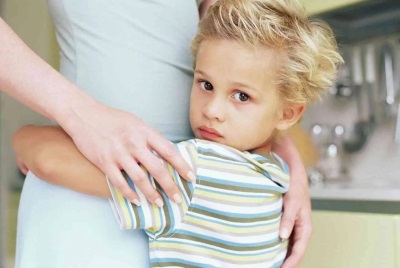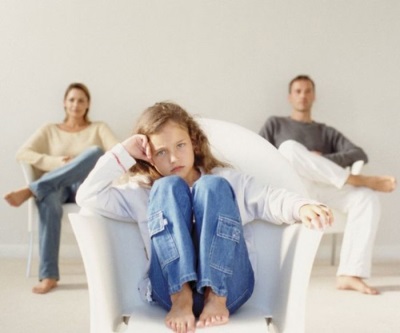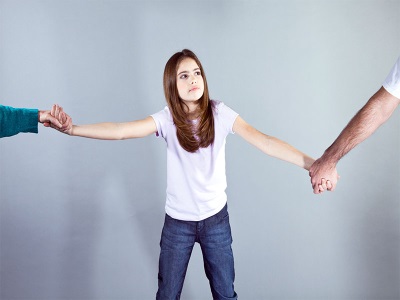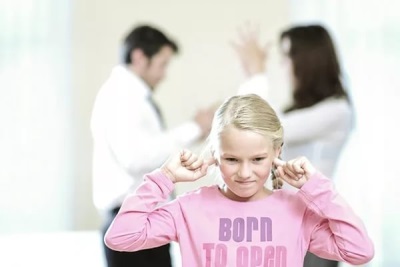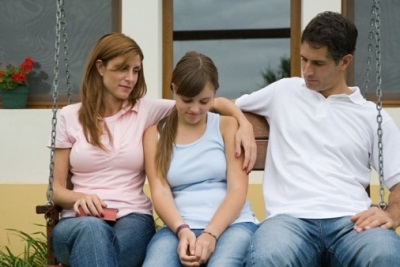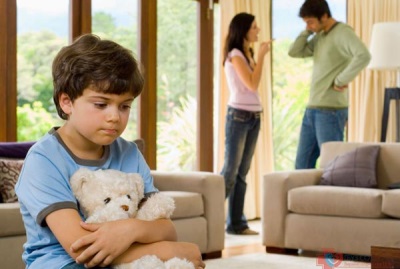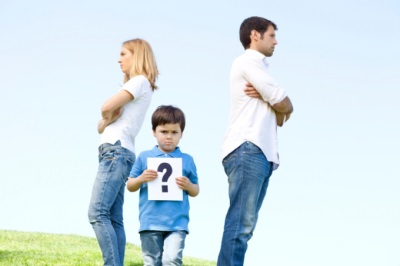The impact of divorce on the psyche of the child and the order of communication of parents after the divorce
This is very painful. Scary and insulting. Divorce has never brought anyone satisfaction. Even if the spouses part by mutual desire (which is not so often), even if they all did it in a “civilized” way, both are frustrated, hurt, lost. In Russia today, according to Rosstat statistics, about 50% of families fall apart. Moreover, most of the divorces are in those families where the husband and wife have been married for 5 to 9 years. This is a long time. And, as a rule, there are already children in such cells of society.
The situations, of course, are different, and sometimes a divorce really becomes the only sensible solution, but only adults decide to leave. And children - always, in all cases without exception, become hostages of parental divorce.
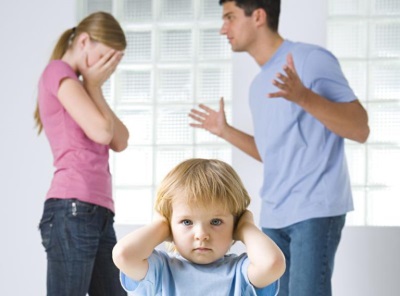
Every child, regardless of age and temperament, upbringing, religion, citizenship and a place on the social ladder, loves his mom and dad equally. For him, the loss of contact with any of them is not even an injury, but a real catastrophe.
In order to at least approximately imagine what your child feels, take as a basis your experiences and multiply them by two. And it will not be all.
Impact on the psyche of the child
Strange as it may seem, the divorce of parents affects the unborn children. If it so happens that the family broke up during the pregnancy of the woman, the crumb in her womb is experiencing the spectrum of my mother's negative emotions, he is attacked by incredible doses of stress hormones. A baby can be born with serious disturbances in the work of the nervous system, in the psyche. In 90% of cases, these children are very anxious, capricious, often sick.

Disorder in the family feel and infants and older children. What are they experiencing?
Externally, your offspring may not show anything, especially if the conflict on the home front has been developing for a long time, and everyone is already pretty tired of shouting, disassembling and slamming the door. In this case, the child is likely to treat the divorce as the logical conclusion of a difficult period. But inside he will blaze fires and erupt volcanoes, because internal stress (by the way, the most dangerous for human life and health) is not going anywhere by itself. It accumulates, grows.
Often, to him "to help" comes the complex of his own guilt for what happened. It happens in children aged 2 to 7 years. The fact is that a child, due to his age, cannot understand all the real reasons for the divorce of parents. That is why "appoints" the guilty - himself. "Dad left because I'm bad." "Mom left because she did not obey." This terrible state breaks the soul of a child into two parts. One stays with mom. The other is with the father. Plus self-indulgence. The result is fears (up to the development of phobias), hysteria, aggression, or another extreme - isolation and tearfulness.
If such children are not helped in time, the consequences will be dire - mental disorders, the inability to build their own families in the future.
Children 9-12 years old go to the other extreme - they begin to feel a strong anger at the departed parent (usually dad), resentment, they have a feeling of their own uselessness. Especially if the remaining parent rushes to arrange his personal life - look for a new "dad" or "mom." The child is left alone with his misfortune.
Teenagers usually meet the news of divorce with a strong protest, especially if the family was prosperous or seemed so. More boys are “buzzing”; they categorically blame moms for dad's leaving, or, on the contrary, trampling the authority of their father and take the side of their mother. Thus, they suppress the masculine principle in themselves and launch the “self-destruction” program. Teenage girls experience parental divorce more restrained, but no less strongly.
Many adolescents admit that they began to feel burning shame for an incomplete family in front of their peers. And almost all the guys from families where a divorce recently occurred have reduced intellectual abilities. Children begin to learn worse, become scattered, unorganized.
Stress from parental divorce at any age can be so severe that a child becomes physically sick. Some already grown-up guys start writing at night. In adolescent girls, the menstrual cycle fails. Not so rarely in children begin manifestations of allergies, skin diseases. Exacerbated chronic illnesses.
The most difficult period is the first time after the divorce. Somewhere around 6 to 8 weeks you will be unbearably sad, lonely, insulting and scary. And then another half a year the stage of adaptation to a new life will last. It is important that during this period we, adults, make an effort to curb our negative emotions and organize the child’s life correctly. Because he is doubly harder. Remember this.
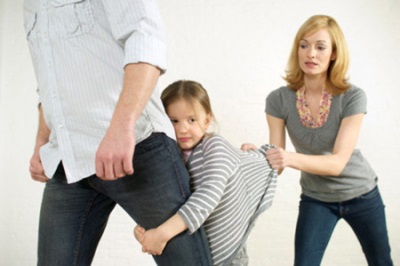
To find out what the child feels when parents divorce, you can see the next video.
How to tell about the divorce child
If the decision has already been made, and it is final and irrevocable, clearly plan a conversation with your children. If the fact of parting is still not obvious, do not rush to “wring the nerves” to your child. You need to speak only when there are no false hopes for family reunification.
Who should say about the upcoming divorce? It is up to you. More often the mission of the messenger with bad news goes to mom. But it can be both dad and both spouses together. If you do not find the strength to keep emotions under control, hand over an important conversation to your grandmother, grandfather, aunt or uncle of a child. The main thing is to trust the kid to the person who undertook to explain to him the immediate prospects of the family. And do your own to try to be present at this conversation.
For an important conversation you need to carefully prepare. In your adult head, put everything on the shelves to be ready for any questions of the child.
For the conversation you need to choose the right time. Best of all, if it is a day off, when a child does not need to go to school, to kindergarten and to classes in the section. At the same time, he should not have planned any important business or responsible event. It is not known how the baby will take unpleasant news. Hysteria can happen, he may need solitude. Let the conversation take place at home, in a familiar setting.
Who to talk to?
All children deserve the truth. But not all of them, by virtue of age, will be able to accept your truth, much less understand it. Therefore, it is better not to discuss the upcoming divorce with a child who is not yet 3 years old. Wait until the kid starts asking questions himself. And soon he will ask where Dad is, why he only comes on the day off, where he lives. Prepare the answers. There is still time.

Report in the upcoming divorce is necessary for children from 3 and older. The main principle is this: the younger the child, the less detail he should speak.
How to build a conversation?
Fair. Straight. Open.
- Express yourself in simple words that the child understands at his age. The use of unfamiliar clever expressions and terms, the meaning of which the child does not understand, will cause alarm and even panic.
- The older the child, the more frankly your conversation should be. Use the pronoun "we." "We decided", "We have consulted and want to tell you." Speak of divorce as an unpleasant, but temporary phenomenon. Ask for help from a teenager to survive a difficult period. "I can not cope without you," "I really need your support." Children love it, and will gladly take on additional responsibility.
- We must speak honestly. Focus on your feelings, but do not go too far. "Yes, it is very painful and unpleasant for me, but I am grateful to Dad for having such a beautiful and beloved you." Emphasize that divorce is, by and large, a normal process. Life is not over, everything goes on. The main idea when talking with a child should be that dad and mom will still love their son or daughter, take care, educate. Just live together, they will not be.
- It is not necessary to lie to a child, to explain the absence of a father or mother "urgent matters in another city." Children have a well-developed intuition, and even if they do not know the true causes of the catastrophe taking place in the house, they will perfectly feel your lies. And this misunderstanding will terrify them. In addition, they can no longer trust you.
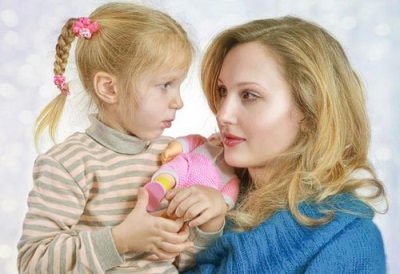
Telling the child about the upcoming divorce, you need to avoid the negative evaluation of his recently recently beloved second half. Your baby doesn’t need your dirty details - who changed whom, who stopped loving whom, etc. For him, both parents must remain good and loved. When he grows up, he will understand everything himself. But if the separation is due to the pathological dependence of one of the family members - alcoholism, drug addiction, gambling, it makes no sense to hide it. However, it is necessary to speak on this topic correctly and accurately.
What not to do?
Divorcing parents, as a rule, make the same mistakes. The main one is the obsession with one’s own experiences, the inability to put oneself in the child’s place. It is foolish to demand full adequacy from people who are under severe stress, so just remember what you cannot do during a divorce in the presence of a child:
- Clarify relationships, use offensive and degrading expressions, exaggerate the details of the upcoming divorce, division of property. Who and how much you should find out in the courtroom or when the child will not be home. Overheard a conversation of such content can give a growing person a reason to reflect on the topic: "How can they talk about the apartment and the car now that our family is falling apart?" This will form the wrong set for the future - the material will be more important than the spiritual.
- Cry, make tantrums. Your negative outburst hurts the child to the most vulnerable spot. Want to pry? Go to your friend, to your mother, to a psychotherapist. There you can easily cry and complain about the "ungrateful cattle."
- Dramatically change the order of life and family life. Let for a child after a divorce everything flows in a familiar rhythm. He and no travel harder nowhere.
- To manipulate the child in a relationship with the already former second half, to limit communication with the father.
- To emphasize to the child his resemblance to the former spouse (spouse), if he has done something bad. It is impossible to shout at the son who has broken an expensive vase, that he is “all in father”. The image of the father will be associated with the child only with bad deeds. Yes, and this behavior does not paint you.
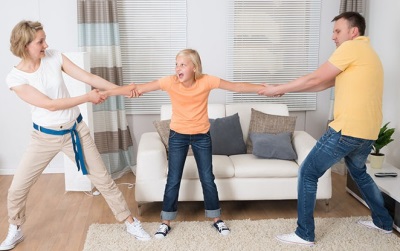
Psychologist tips
- Do not be shy to seek help from a specialist. Divorce - too powerful stress and severe test for the psyche of adults. For a child, it is comparable to a nuclear catastrophe. Often, without the help of an experienced psychologist, neither you nor the child can handle it.
- Children in a family that falls apart or has already collapsed are doubly in need of attention. Spend time with them, make sure that stress is not out of control and does not turn into a severe depression or mental disorder in a child.
- Try to spend the weekend, as before, the whole family. Of course, if the relationship with the spouse remained benevolent. This will require a great deal of self-control and self-control from the woman, but it's worth it. In such an environment, the child will be easier to get used to the new life.
- Do not tear your evil child. Do not listen to advisers, who assure that a boy left without a father's upbringing needs to be raised harder and more severe. Such mothers grab the belt with or without a stricter punishment system and gradually become real dictators.
Another category of mothers after a divorce is trying to compensate the child for the lack of a father with gifts and affection. As a result, they grow spoiled pampered sons, which is difficult to become real men.
For information on how to raise a child without a father, see the video of a clinical psychologist Veronika Stepanova.
How to help yourself and your child survive a divorce, you can watch in the next video.
After divorce
Divorce, of course, is a serious injury for a child, but sometimes it is better than continuing to live in a family where there is no mutual understanding and respect for a long time, where parents compete who will shout louder or slam the door. The consequences of a divorce for a child in the future are often less serious than the consequences of living in an inadequate aggressive environment.

It is good if the child can continue to communicate with the father and his relatives after the divorce. If this is not possible, you can ask your friends for help - men, other relatives - the representatives of the stronger sex, because the child (especially the boy) needs to communicate with his peers in gender.
Why is it worth finding a father mentor son, look in the next video, where psychologist Irina Mlodik tells many nuances.
In Russia, children usually stay with their mother. But there are exceptions. Minors can go to live with their father by court decision, if the mother leads an asocial lifestyle, suffers from alcoholism, uses drugs.
How children and parents will communicate after a divorce depends on how the former spouses will be able to agree. It would be nice to establish the order of communication with the child after the divorce: who and when takes him to the pool, who takes, when dad can take the child to the cinema, and when mom goes on a tour with him.
So that the child does not feel chaos, mom and dad need to strictly adhere to the schedule of communication. Both parents should be able to keep their word - they promised to come after the child on Saturday, please fulfill. Parents should also decide on their own time.
It is desirable if the former spouses will be able to find at least one day per month for joint leisure. A child needs not only visits with his dad or mom, he needs to be at least occasionally with both of them.
Do not turn the child into a spy, do not ask the son who has returned from the pizzeria after the meeting with the father, how is the dad where he lives, does he have anybody, what does he look like? Happy?
Avoid discussing divorce in meetings with your child. What was, then passed.
If the former husband and wife fail to build a constructive dialogue and independently agree on the procedure for communicating with the child after the divorce, this may cause additional stress for the baby. How happy will the peanut, whom mom is trying to limit communication with her father? Both parents by law have the same rights to their son or daughter. If one party tries to infringe on the legal right of another, it will help to appeal to the court with a corresponding statement of claim. Then the ministers of Themis will set the schedule and time of communication with the child.
I am a supporter of dialogue, not lawsuits, and therefore I am sure that two adults can always agree on the condition that they have such a desire. In the end, the child is not to blame. Divorce is only your decision. Do not let him ruin the life of your baby. After all, this is a separate person, unique, loving and waiting for reciprocal love. From both of you.
In the next video, psychologist Olga Kuleshova will talk about some of the nuances of a divorce and how they can affect the psyche of the child and his future life.
About who the children remain after the divorce, see the following video.
For information on how best to tell a child about the divorce of parents, see the following video.

